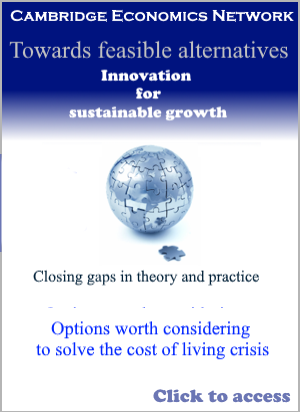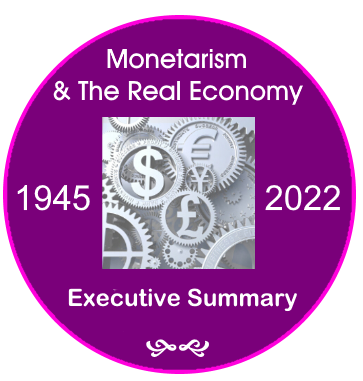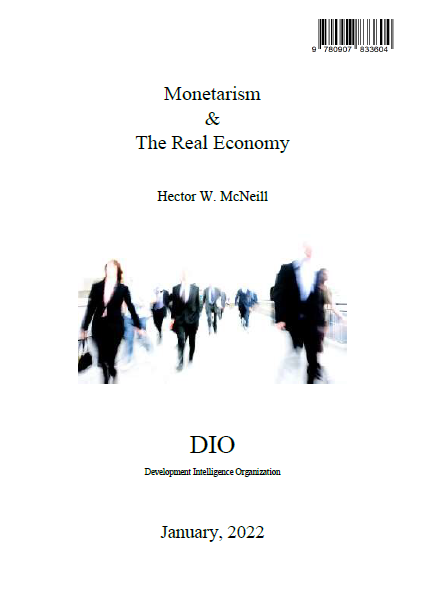| Development Intelligence | 2020 |
Introduction Economic Development Report The Economic Paradigms About DIO Leading Issues Sustainable development prospects - publication series
|
|
The Development Intellgence Review 2022
New publication


Cambridge Economics Network has published an important paper entitled, "Options worth considering to solve the cost of living crisis" by the economist Hector McNeill which provides a transparent justification of a Real Incomes Policy (RIP). The current government promise of cash grants to low income families is stated to be no more than a palliative since this does nothing to stop price inflation.
RIP is designed to achieve immediate declines in the rate of increase in prices, to stablize and then reverse them while reducing corporate risk associated with this policy.
The paper emphasises that government has very few options under monetarism or monetary policy because this framework has built up an overbearing debt-taxation trap within which any government outlays result in later rises in taxes. Over 25% of the population cannot afford to pay tax with increasing numbers entering the state of "poverty" within which constituents cannot afford to purchase their basic essentials. Most of the constituents within the "poverty" category are employed. This state of affairs is cause by the very high levels of income disparity and the declining purchasing power of the currency.
To access this paper click on the image above, left.
 The Development Intelligence Organization is pleased to announce the release of the 2022 Development Intelligence Review - see far right - with the title of:
The Development Intelligence Organization is pleased to announce the release of the 2022 Development Intelligence Review - see far right - with the title of:
Monetarism & The Real Economy
This document was accepted to make up a whole edition of the Q1-2022, British Strategic Review with the title of, Monetarism and The Real Economy
A free Executive Summary is now available, see below.
A general update of this publication and list of contents can be found on the BSR site.
The first overview by the economist Nevit Turk can be found here on the Hambrook Publishing Co site.
In this edition of the BSR the following significant economic issues are presented:
How to obtain a copy
A free epub or pdf executive summary of the BSR is available for download below. Some browsers do not handle epub downloads well so we have zipped the epub to protect it. Therefore the available epub is in a Zip file which needs to be unzipped when downloaded. The full BSR document in epub or pdf formats can be purchased, for just £10.oo a copy. At the moment a technical issue associated with card payments is being resolved with PayPal and we will post this facility when this issues is resolved.
The theme of this edition of the Review is "Monetarism & The Real Economy" and we consider it to be the most important Review ever produced because it reveals in some detail the mechanisms whereby monetarism impacts the real economy in using previously unpublished content. An unusual aspect of this Review is that the efficiacy of monetary theory is challenged on the basis of logical analysis and a simple explanation of the key mechanisms that impact prices, growth and employment. However, the variables that determine these indicators are absent from monetary theory and the indentities used by policy makers, such as the Quantity Theory of Money. The undisputable evidence used to as proof of this contention can be found in the self-evident impacts of quantative easing QE) on the cross-sector input and output prices.
General commentary
RIP is designed to achieve immediate declines in the rate of increase in prices, to stablize and then reverse them while reducing corporate risk associated with this policy.
The paper emphasises that government has very few options under monetarism or monetary policy because this framework has built up an overbearing debt-taxation trap within which any government outlays result in later rises in taxes. Over 25% of the population cannot afford to pay tax with increasing numbers entering the state of "poverty" within which constituents cannot afford to purchase their basic essentials. Most of the constituents within the "poverty" category are employed. This state of affairs is cause by the very high levels of income disparity and the declining purchasing power of the currency.
To access this paper click on the image above, left.
 The Development Intelligence Organization is pleased to announce the release of the 2022 Development Intelligence Review - see far right - with the title of:
The Development Intelligence Organization is pleased to announce the release of the 2022 Development Intelligence Review - see far right - with the title of:Monetarism & The Real Economy
This document was accepted to make up a whole edition of the Q1-2022, British Strategic Review with the title of, Monetarism and The Real Economy
A free Executive Summary is now available, see below.
A general update of this publication and list of contents can be found on the BSR site.
The first overview by the economist Nevit Turk can be found here on the Hambrook Publishing Co site.
In this edition of the BSR the following significant economic issues are presented:
|
How to obtain a copy
A free epub or pdf executive summary of the BSR is available for download below. Some browsers do not handle epub downloads well so we have zipped the epub to protect it. Therefore the available epub is in a Zip file which needs to be unzipped when downloaded. The full BSR document in epub or pdf formats can be purchased, for just £10.oo a copy. At the moment a technical issue associated with card payments is being resolved with PayPal and we will post this facility when this issues is resolved.
 | 
|
The theme of this edition of the Review is "Monetarism & The Real Economy" and we consider it to be the most important Review ever produced because it reveals in some detail the mechanisms whereby monetarism impacts the real economy in using previously unpublished content. An unusual aspect of this Review is that the efficiacy of monetary theory is challenged on the basis of logical analysis and a simple explanation of the key mechanisms that impact prices, growth and employment. However, the variables that determine these indicators are absent from monetary theory and the indentities used by policy makers, such as the Quantity Theory of Money. The undisputable evidence used to as proof of this contention can be found in the self-evident impacts of quantative easing QE) on the cross-sector input and output prices.
General commentary
The perennial challenge to economic development policy makers is how to manage economies whose basic characteristics are the diversity and complexity of the social and economic constituencies. The rising levels of financialization, initiated in the 1970s, progressed to generate the inevitable 2007-2008 financial crisis. A significant distortion of the representation in the decisions making on policy led to bail outs paid out of government funds or debt creating a subsequent tightening on other government provisions associated with slow or no economic growth. What was considered to be a "solution" through the low interest rate policy of quantitative easing was supposed to help "re capitalize bank balance sheets". However the "cheap money" appears to have been used increasingly, not to pass on the interest benefits in the form of loans for investment in higher productivity activities. A considerable amount of funding has been used by banks to take up asset positions or to trade in assets and commodities to benefit their own shareholders. There has been a considerable amount of lower interest finance services provided for corporations to buy back shares to drive up the stock markets. In the meantime, the needs of the real economy in the form of services, manufacturing and agriculture being starved of necessary finance. This has exacerbated the state of affairs as reflected in :

A leading issue has become the reduced funding available for international development for developing countries and a disappointing levels of achievement of agricultural and rural development projects. There is therefore a need for action to raise the quality of projects to achieve higher rates of success (see Leading Issues).
The Development Intelligence Organization (DIO) has the role identifying the most promising advances in economic theory and practice including business and project cycle management levels that can help address and rectify these types of challenge. The rate of advance of economic theory is extremely slow because of the inertia created by vested interests in the current state of affairs. As a result, as the economic circumstances worsen, under so-called austerity measures, the social and political domains have become increasingly contentious and more difficult to manage because of the increasing frustration on the part of segments of electorates.
Our objective is to identify those specific advances in economic analysis and propositions that have the most likely a practical potential to address these common challenges in developed, transition and developing economies.
Reference: Open Quality Standards Initiative, Project failure stats, 2017, OQSI
|
|

A leading issue has become the reduced funding available for international development for developing countries and a disappointing levels of achievement of agricultural and rural development projects. There is therefore a need for action to raise the quality of projects to achieve higher rates of success (see Leading Issues).
The Development Intelligence Organization (DIO) has the role identifying the most promising advances in economic theory and practice including business and project cycle management levels that can help address and rectify these types of challenge. The rate of advance of economic theory is extremely slow because of the inertia created by vested interests in the current state of affairs. As a result, as the economic circumstances worsen, under so-called austerity measures, the social and political domains have become increasingly contentious and more difficult to manage because of the increasing frustration on the part of segments of electorates.
Our objective is to identify those specific advances in economic analysis and propositions that have the most likely a practical potential to address these common challenges in developed, transition and developing economies.
Reference: Open Quality Standards Initiative, Project failure stats, 2017, OQSI



